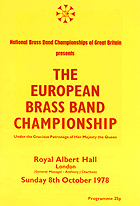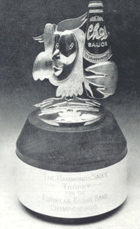European Championships - The First European Championships
26-Apr-2004Royal Albert Hall, London
Sunday 8th October 1978
4BR casts a long look back to those sepia tinted days of the late 1970's and the first European Championships. It was 1978 - Liverpool retained the European Cup, Lucius won the Grand National, we still had a Labour Government and the Christmas mas number 1 that year was "Mary's Boy Child" by Boney M. Things were just as bad then.
 It was 1978 that the first official European Brass Band Championships were held. We say "official" as there is some debate to whether the event that took place at the Royal Albert Hall in London on Sunday 8th October 1978 was the first.
It was 1978 that the first official European Brass Band Championships were held. We say "official" as there is some debate to whether the event that took place at the Royal Albert Hall in London on Sunday 8th October 1978 was the first.
There was a fledgling "European Contest" held in the Netherlands in 1977, and the rumour still persists that Boosey and Hawkes themselves bought the rights to the contest and relaunched it the following year in London. That however is another story.
Suffice to say though that following the ill fated experiment of the World Championships that were held at the same venue at the beginning of the decade, there were many who thought that the European was going to be nothing more than another chance for the British bands to have yet another contest amongst themselves, especially as the previous day the National Championships were held at the same venue where Yorkshire Imperial won on Checkmate.
The contest itself came under the organisational abilities of the infamous Robert Alexander, a somewhat shadowy figure who had an almost "Stalinist" approach to democratic debate and representation and who was in charge of the National Finals throughout the turbulent 1970's. He wasn't a very popular figure but did make the decision to run the European – then again they say that Mussolini made the trains run on time, so you take pick don't you?
As Chairman of the event, he made one or two strange remarks to the audience in his Message in the initial programme (which cost the princely sum of 25p). Here he welcomed everyone to the inaugural event, but made the point that he hoped that the Championships would be moved to a Saturday to enable those European bands with Christian or political associations to be able to attend in future and that following the contest, many decisions about the future of the contest had to be made in collaboration with European Associations (even odder, given the mans none to impressive track record of consultation). It wasn't until quite a few years later that the organisation of the event was passed over to a European Association.
Still, with this all done, and under the gracious patronage of Her Majesty the Queen (strange that even after all these years, she still has yet to make an appearance at any of the contests she patronises) 14 bands from 11 countries were invited to compete.
The rules governing how the bands were chosen, were a little unclear, but the bands that took the contest stage for the historic first Championship were as follows:
Brass Band St. Cecilla conducted by J.P. Leveugle from Belgium; Kobenhan's Brass Band conducted by F.H. Rasmussen from Denmark; Silkeborg Blaeserne conducted by O. Jensen from Denmark; Black Dyke Mills conducted by P. Parkes from England; Grimethorpe Colliery conducted by Stanley Boddington from England; Brass Band Rotterdam conducted by M. Janson from Holland; The Steadfast Band conducted by G. Dyke from Ireland; Manger Musikklag conducted by T. Brevik from Norway; Metronome 66 conducted by H. Gulbrandsen from Norway; Templemore Band conducted by J. Burch from Northern Ireland; Bo'ness and Carriden conducted by B. Thompson from Scotland; Solna Brass conducted by G. Borkland from Sweden; Feldmusikgesellschaft Frohsinn Schotz conducted by A. Winkler from Switzerland and Tredegar Town conducted by W. Thomas from Wales.
However, before the contest, the Rotterdam Brass Band withdrew and only 13 bands took to the stage on the day.
The six adjudicators were William Relton from England, Jean Pierre Laro from Holland and Trevor Ford from England for the set work and Geoffrey Brand from England, Herbert Moller from Denmark and Paul Huber from Switzerland for the "Own Choice" section.
The set work for the Championships was chosen as Introduction, Elegy and Caprice by Morley Calvert which was written especially for the event. Calvert was strangely a Canadian – strange as it was the European Championships. Still – we digress from the contest.
An interesting pre contest approach was made to the bands by the organisers in that as it was to be such an important event, the bands themselves should contribute something towards European harmony, yet still retain their individual national identity (some things never change do they?) by performing works that reflected their national characteristics. Thus, many of the bands were under the impression that they had to perform something with a "National" flavour and many took this as a direct request from the organisers.
Thus, the "Own Choice" works varied greatly – with some bands playing works that had a link to their country (Tredegar performed Owain Glyndwr by Maldwyn Price) whilst others took the harmony thing a bit too far - the Irish Band, Steadfast played Norwegian Carnival and St. Cecilia from Belgium even more oddly performed a piece called Canadian Impressions.
The English were rumoured not to have entered into the spirit of the request though, and Black Dyke were down to play Variations on a Ninth in the programme but played Connotations instead, whilst Grimethorpe repeated Checkmate from the day before when they came 3rd at the National Finals. The contest also saw the very first contest performance of one of the great brass band works, when Solna of Sweden chose to play Contest Music by Wilfred Heaton – a piece ignored and rejected by the National Championships of Great Britain five years previously.
The other bands chose the following:
Templemore – Scena Sinfonica by Henry Gheel; Bo'ness – Connotations by Edward Gregson; Kobenhavn – Suite Artica by Pall Pallson; Silkeborg – Spectrum by Gilbert Vinter; Rotterdam – The Sea (Thallasa) by Denis Wright; Metronome 66 – Down Under by Ronald Hanmer; Feldmusikgesellschaft - Herbstimpressionen by Albert Benz.
Interesting choices eh?
Also, there was no secrecy in the way in which those choices were made and the bands and their chosen works were printed in the programme – after the bands name in the draw list. This practice continued for some years before it was rather mysteriously dropped.
 The top prize was the grand sum of £1000, whilst interestingly the second prize of £750 came from the Hammond's Sauce Company and took the form of a small statuette of an owl holding a bottle of Chop sauce on a small wooden base.
The top prize was the grand sum of £1000, whilst interestingly the second prize of £750 came from the Hammond's Sauce Company and took the form of a small statuette of an owl holding a bottle of Chop sauce on a small wooden base.
There were further prizes for the bands that came 3rd, 4th and 5th and each of the non prize winning bands from the continent received a new "Sovereign" cornet for their troubles. The top prize was to be determined by the aggregate marks of the two works performed and the programme announced that "individual marks for each section would not be announced but will be available to the competing bands, as will adjudicators notes".
The contest started early on the Sunday morning, and the honour of being the first band to perform at the Championships fell to the Templemore Band from Northern Ireland with fellow Irish contenders, Steadfast following them on. Pre contest favourites, Black Dyke were drawn 13 out of 14, whilst Grimethorpe were number 8. Of the fancied competitors from overseas, Solna were drawn number 10 and Manger number 12.
After the morning session another draw was made (not before the contest as is now the case) and the bands lined up again to perform their own choice works.
First up were Metronome 66, who performed the now rarely heard Down Under by Ronald Hanmer and they were followed on stage by St. Cecilia and Grimethorpe at number 3. Black Dyke waited until number 10, whist Solna were number 5 with Tredegar just before them and Scotland's representatives, Bo'ness number 6. The last band to play on the day at the inaugural contest were Templemore who therefore had the rare distinction of having to wait around all day after playing first and last in the two sections.
Come the prize's and the top 5 bands were announced from the stage.
Fifth place went to Tredegar Town Band with 170pts, conducted by David Thomas, whilst fourth spot went to fellow Celts, Bo'ness and Carriden conducted by Bryden Thomson who were awarded 171pts.
It was the announcement of the third prize however that raised the eyebrows, as throughout the day there were continual mutterings that the standard of the European bands was nowhere near that of the British contingent. This was true and therefore it came as something of a major surprise that third place went to the Solna Brass Band with 174pts from Sweden who chose Contest Music as their own choice selection.
After all these years, the decision to award them 3rd place seemed more "political" than deserving, although it would seem to be harsh on the band themselves. Anyway, it could be said that if no European band came in the prizes, then it could have been more than feasibly possible that the contest itself may have been still born and suffered the same fate as the World Championships just seven years previously. Sometimes success is born of not of endeavour.
And so, just as everyone thought, the contest came down to the best bands in the UK with Grimethorpe Colliery awarded the runners up spot, a 7 point margin ahead of Solna with 181 points. Their choice of Checkmate made sense, but highlighted one of the problems of the contest being held the day after the British Nationals – rule changes in the next year stopped the problem being repeated. Grimethorpe picked up the cheque and the amazing trophy and headed back to Yorkshire.
Meanwhile the winning band was announced. Black Dyke Mills under the direction of Peter Parkes were the winners and the first Champion Band of Europe with a huge 10 point winning margin over the rest of the field with 191 points.
They didn't pick up the now famous trophy as that wasn't presented until 1981 and in fact were presented with the trophy that the band that now comes third gets. They also picked up the cheque for £1000 and started on their almost Real Madrid like domination of the biggest contest in the banding world – until Yorkshire Building Society came along.
Of the others, some of their futures are well known, whilst others are not. What for instance happened to Feldmusikgesellschaft Froshsinn Schotz?
Results: First European Championship
Royal Albert Hall, London
Sunday 8th October 1978
1. Black Dyke Mills (Peter Parkes) - 191pts
2. Grimethorpe Colliery (Stanley Boddington) - 181pts
3. Solna Brass (G. Borkland) - 174pts
4. Bo'ness and Carriden (Bryden Thomson) - 171pts
5. Tredegar Town (David Thomas) - 170pts















